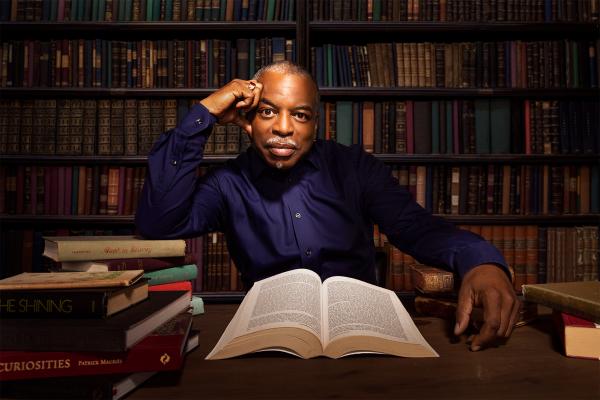LeVar Burton
National Humanities Medal
2023

—Photo by Robyn Von Swank

—Photo by Robyn Von Swank
LeVar Burton’s impact as a storyteller spans time and space. At nineteen years old, he became a household name for his Emmy-nominated portrayal of the adolescent Kunta Kinte in the 1977 television miniseries Roots. Ten years later, he navigated the USS Enterprise as Geordi La Forge in Star Trek: The Next Generation. But anyone who attended grade school after 1983, along with their parents, grandparents, teachers, and librarians, know him as LeVar Burton, the magnetic host of the beloved PBS series Reading Rainbow.
Reading Rainbow was created to combat declining literacy in school-aged children over summer vacation by encouraging kids to read. The magazine-style format featured readings of illustrated books, on-location “field trips” to connect the stories to real-world adventures, and unscripted book reviews by kids.
“This method of storytelling, linking literature to real-world experience, can give kids an idea that the world is a vast place of infinite variety, where you can go anywhere, be anything,” says Burton in a Los Angeles Times article.
When funding for a pilot was secured, the search for a host began. The producers wanted someone who could connect with kids on a personal level like Fred Rogers, yet engaging enough to grab school-aged kids’ attention. Early attempts were unsuccessful until Burton’s name was suggested, having hosted another PBS show, Rebop. The producers thought the twenty-four-year-old Burton was perfect, but too big a star. They made the call anyway.
When Burton heard the pitch for Reading Rainbow, it was an easy yes. The connection from Roots and Reading Rainbow was direct. In the documentary Butterfly in the Sky, Burton says, “The story of slavery in America had never been told from the perspective and point of view of the Black people before. . . . In eight nights of television, an entire country was changed. Roots taught me about the power of the medium of television.”
Burton was also a voracious reader and the show’s focus of inspiring a love of reading in children was close to his heart. He credits his mother Erma Gene Christian for his lifelong love of reading. He writes for the blog Reading is Fundamental: “As an English teacher, my mother knew the importance of not only reading to me, but in front of me—providing an example and a set of incredible footsteps in which I follow.”
Burton agreed to make the pilot. “Let’s use the medium of television to steer kids back in the direction of literature and the written word,” he says.
After the pilot was filmed, in 1981, Reading Rainbow was given the green light and hit the airwaves in July 1983 with Burton as its host and executive producer. His authentic enthusiasm, passion for reading, trustworthy voice, and ability to connect with viewers on a deeply personal level made each thirty-minute episode feel like an exciting adventure shared with friends. And, with positive representation of African Americans lacking on 1980s television, Burton’s presence on a children’s show was even more impactful.
With Burton as Reading Rainbow’s trusted guide, the show became a hit. In 1984, the Buffalo News reported 6.5 million viewers watched at least one episode of Reading Rainbow a week, and kids who watched Reading Rainbow became readers. Librarians reported an increase in summer reading, and children’s book sales increased 800 percent. It became the most-used television resource in our nation’s classrooms.
In 1986, Burton was approached to star in Star Trek: The Next Generation as Geordi La Forge, the blind Starfleet engineer. Science fiction was one of his favorite genres, and Burton is a big fan of the original Star Trek series for portraying a vision of the future where people of color were included.
With the new job, Burton was set to leave Reading Rainbow, and the producers began auditioning new hosts. But he had a change of heart. “I felt that there was still work for us to do.” With the support of both the Reading Rainbow and Star Trek teams, Burton was able to work on both shows. In “The Bionic Bunny” episode of Reading Rainbow, filmed on the set of Star Trek, Burton said, “You know, there’s something else that can help you explore the universe. Books.”
By 2006, 12 years after Star Trek ended, the public funding dried up and the book officially closed on Reading Rainbow. During its 26-year production, one of the longest-running children’s shows in PBS history, it won more than 250 awards including a Peabody Award and 26 Emmys.
Burton succeeded in inspiring generations of children to love reading. He opened their worlds to new neighborhoods, new people, and new ideas. Through books, he encouraged children to find their interests, their voices, their stories. He made the world a better place one book at a time.
On a recent episode of PBS’s Finding Your Roots, host Henry Louis Gates Jr., an NEH Jefferson Lecturer, asked Burton what he’s proudest of. He replied, “You would think Roots because of the magnitude of its impact that it’s had on the planet. . . . But it’s really Reading Rainbow. . . . Believing so much in the power of education, as we do in my family, and having an impact on the reading habits of a couple of generations of human beings, it doesn’t get any better than that.”
—Laura Wolff Scanlan